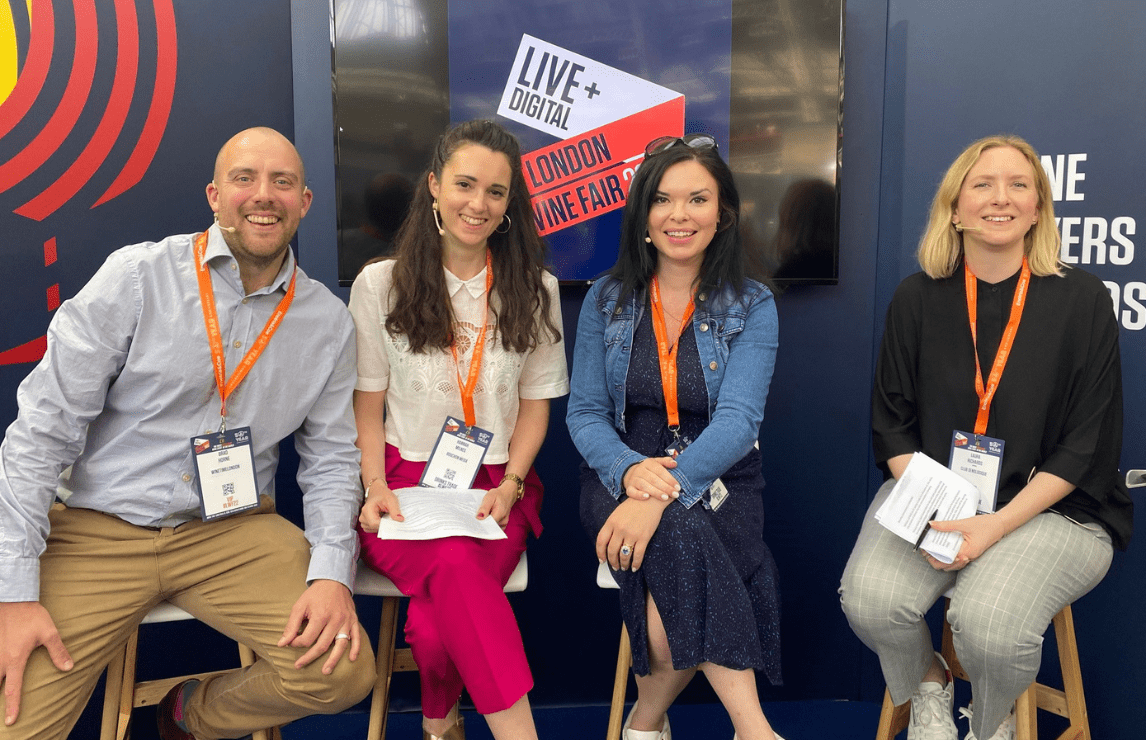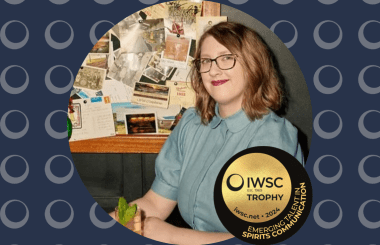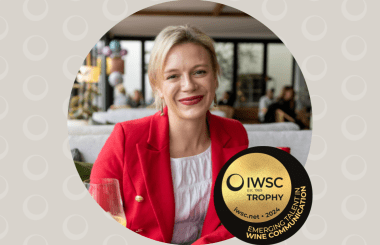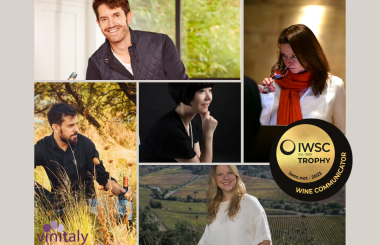“The what, why and where of content: how wine communication is changing”
During this year’s London Wine Fair, we gathered some of our 2022 Emerging Talent entrants together with Laura Richards, the Digital Editor of our consumer media brand, Club Oenologique, who moderated the conversation, to discuss what can brands do to adapt to the ever-changing communication landscape and the future of wine communication.
Each of these panellists went deeper into the world of wine communication during the 2020 lockdown, and so we felt they were perfectly positioned to discuss the present landscape and future of wine communication.
The panel
Brad Horne is a social media wine communicator and presenter. During lockdown he brought the wine world to people’s phones and living rooms via his Instagram show #WineSocial Live. With a following of over 10,000 he also creates content for wine producers and their websites.
Following several years working in wineries in England, as well as in Australia, New Zealand and France, in 2020, Hannah Milnes founded her social media marketing business, Bouchon Media. Her role is to assist wine brands in growing their businesses through social media, developing and implementing strategies and creating content to humanise brands and help them tell their stories.
Wine journalist, presenter and social media communicator, Libby Zietsman-Brodie is City AM’s dedicated wine columnist. Recently she has also had her work published in The Buyer and Club Oenologique, and together with panellist Hannah Milnes is one of four founding members of The Wine Collective, a wine content and strategy cohesive formed to support wine brands.
Discussion
Laura Richards (LR): Having all started communicating about wine in 2020, how do you feel things have changes since lockdown.
Hannah Milnes (HM): I certainly noticed that there was a lot more movement towards social media for online brands. I certainly got a lot more interest. Especially, you know, at the beginning, brands were trying to work out how to reach people, sending out samples for tastings.
I see my style of communicating as ‘this is my journey and I invite you to come along on the ride with me’ because I think that people do buy into you and your brand, who you are, and you're sort of representing and you are telling the stories. Storytelling is so important. It has been proven that the neuro receptors in your brain can pick the stories that light those receptors, and this helps you to remember them better. So that's why storytelling is so important.
Libby Zietsman-Brodie (LZB): Well, I was a theatre producer for 15 years and lockdown kind of squashed that, so I took the drink! And it started very much as a hobby for me. Joining online tastings, I did the WSET level’s 123 over six months and it was a very welcoming space, sort of social media platform, not knowing, not being part of the wine world before that, apart from obviously drinking it and liking it. And I think that is one of the most valuable things that the social media and the online world has to offer, in that if you come into any industry where perhaps you are a minority or minority group, ethnically, gender wise, whatever, it can be a little bit intimidating, whereas entering a world online, how you manage your own online content is entirely up to you. You don't have to put on your gender or what you like look, you can engage with only the people you want to, it's a quite an empowering space. So I entered it through that medium and then I got bitten by the bug! I think this is something that anyone in the wine world can recognise. You start getting obsessed with all the amazing stories, amazing people. I think wine is a naturally generous hearted product. People always want to engage with you and share things with you.
LR: Do you think that audiences have changed in that respect?
LZB: Yeah, I mean, I don't have the longevity of decade's worth of experience, but I do know that the consumers of wine, there is a younger generation coming up and they're very interested in the stories and the people involved and things like sustainability, the background history, which I think social media really empowers them to engage more and ask more questions in a non-intimidating way.
HM: the thing with younger people especially, is authenticity, especially as GenZ, they are particularly looking out for things that they don't trust. They really hold it very important that you are transparent. They don't take any nonsense. So, I think especially that's the thing forthe younger generations.
Brad Horne (BH): I think that’s the same for the older generation too. We've all got mobiles. We’ve all got phones, we're all on Instagram. Some of you might be on Tik Tok. You're all on Facebook. So both sides of the spectrum, love a story. Plus the slightly older generation can also travel to these places probably a little more readily. So if you give them that essence of a place, they really grab hold of that. So for the older generation, they go and see these places and carry on the producers story and journey. So it’s important not to limit targeting communication to one end of the spectrum.
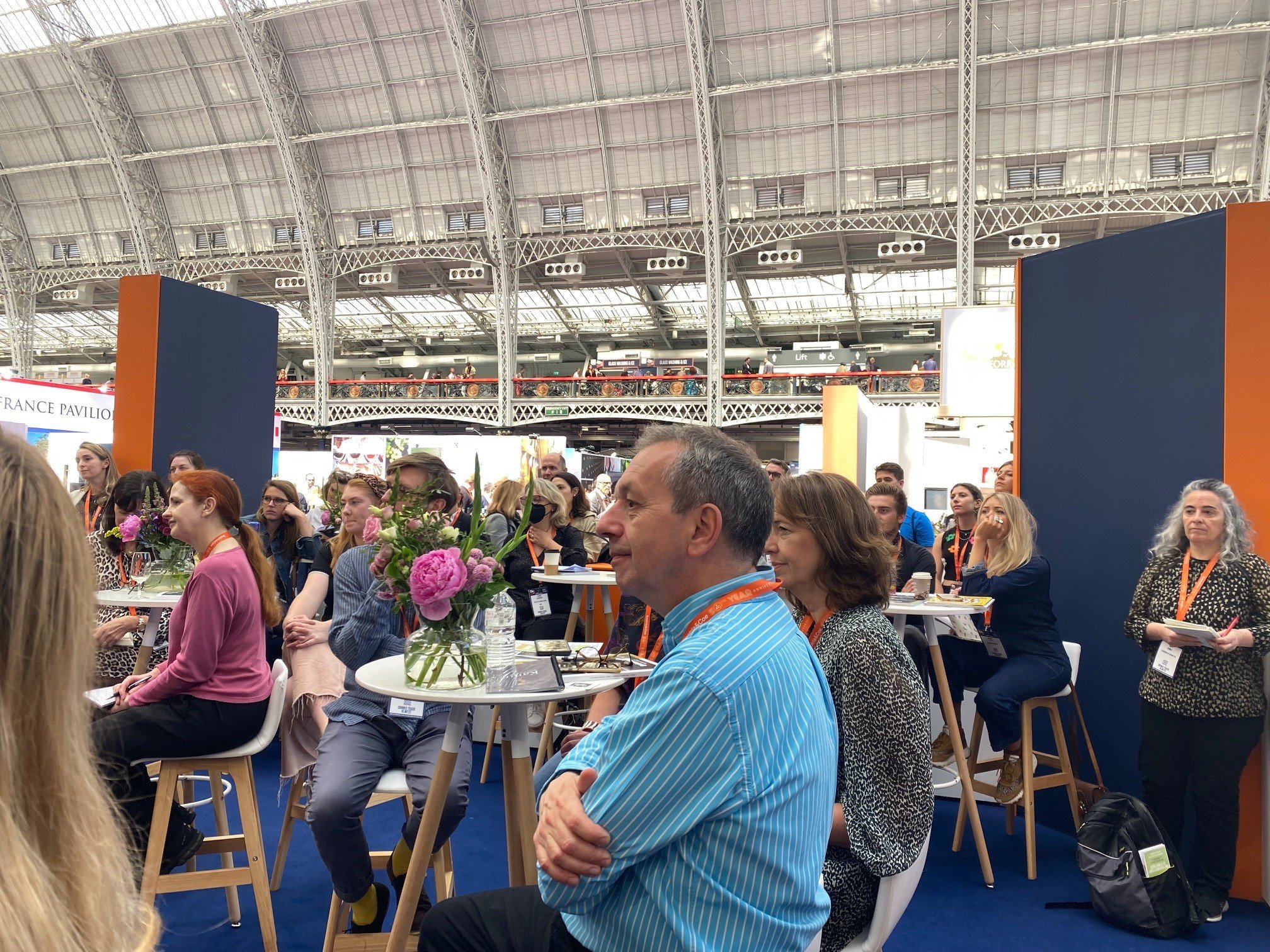
LR: Brad, when you do your Instagram lives, what kind of questions do the audience ask, what are they wanting to learn more about when they're engaging with your content?
BH: Honestly, you think it'd be about the wines themselves, but it's not. It's about the person, their family history, the region. What got them into wine? That's always my first question because everyone in the room will have a different answer. And everyone's story is unique, there might be similarities, but they are all unique. And for me, these are the questions they want the answer to.
Additionally, sustainability has become ever more important. That question always comes up. Are you sustainable? Are you helping the wider community as well?
LR: Do you notice that as well, Libby? Is sustainability the big thing for your audience?
LZB: Absolutely. I also have a consultancy and I work with private clients and it's one of probably the first three questions anyone will ask is about sustainability. And I think that there's now an idea of maybe playing catch up for wine. A lot of people already know that they want their eggs free range or their vegetables organic, but consumers haven't felt they knew enough about what went in the bottle, the chemicals, the processes. And I think that's beginning to open-up and people are being emboldened to ask questions. And the more we allow people to ask questions, the more winemakers, producers, and distributors are held to account and the fact that they stand by their product. I think there's just as you were saying, Hannah, there's a craving for authenticity and openness, more and more.
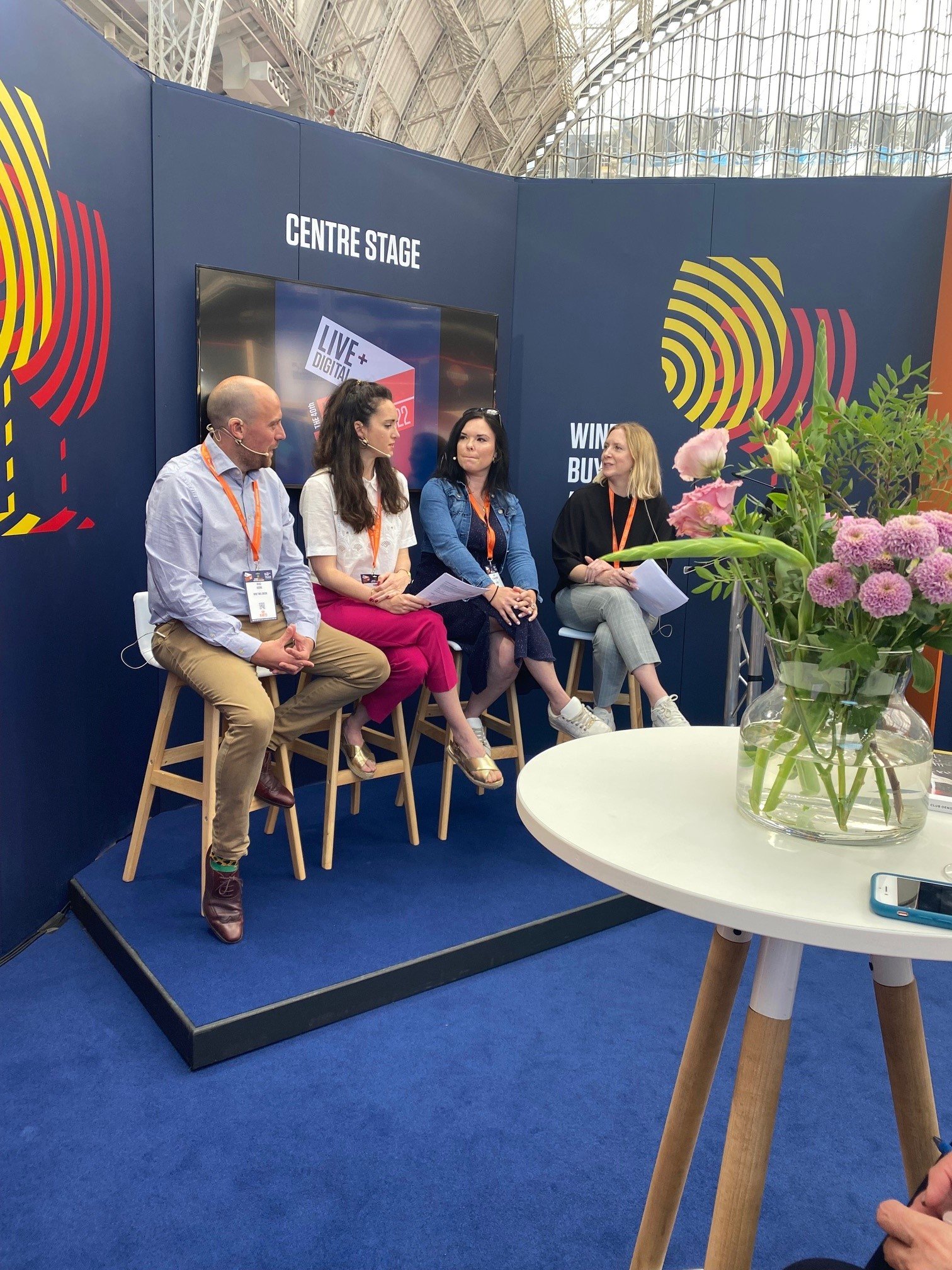
LR: Do you find it difficult to condense those sorts of messages into social media? How would you go about doing that?
HM: My angle is I want to be as creative as possible because social media is so quick, people scroll so quickly that if you don't have something that's eye grabbing immediately, your people are lost. They're going to go. So, you must have something that's creative in the first place. Don't try and get too many messages across in one go, try and limit it to one message per post. That’s different obviously with print or an online story, where someone is willing to dedicate more time.
LZB: One of the great things that social offers is that it’s an opportunity for conversation. If you see something on Twitter or Instagram or online where there’s a comment box, you can ask a question, start a conversation, message that person and get the back and forth going. That's something that's quite new and something that social media enables. Because if you're reading a print piece, you know, there's no back and forth. So, I think actually the back and forth and that engagement is something really important that content can offer.
LR: So, bringing it back to print, you’ve got your fortnightly column. What do you what do you think the role is of print in the digital age?
LZB: Oh, I think print is incredibly valuable. I think they can all work together really, really well. As already said, there are people who want to sit and read a whole article or a whole book, and that's engaging their interest as well. I see social platforms as a foot in the door for people who potentially don't have a history in wine or don't have the background knowledge that gets the foot in the door and then eventually, there'll be buying a book on soil! You know, they'll get there eventually, but it's that foot in the door.
HM: I found that especially because I'm not a natural writer. I am more a visual person. So if social media wasn't around I wouldn't be able to be in the position I am now. So it's thanks to social media that I can, you know, have a voice.
BH: I think even more so, companies, brands, books, magazines are using all the platforms now. And they're all interwoven as one now. We don’t see print as one thing, podcasts as one thing, Instagram as one thing, I think most of the wine brands don't think of media as one thing: it’s all encompassing.
LZB: We now know that people's brains work differently. People learn and understand and get engaged by different forms. So we should be embracing that. If we want people to know more about wine, we need to embrace visual, written, audio, all together.
LR: If a brand wants to get its message out there more broadly, what platforms would you encourage them to get involved with that they can do themselves?
HM: I personally think that people need to get onto TikTok, which is something I've been saying for a long time. Instagram is obviously a given; you can showcase your brand very well with Instagram. People expect to be marketed to on Instagram. TikTok is growing so quickly, it has sort of become its own beast. It's extremely creative. You have to be on it for a long time to understand the nuances of it. As a platform there’s still room for it to grow, it’s still in its early phase so get on it now and you’ll be ahead.
LR: So, given wine brands can do this all now directly, what do you think the role of the communicator is? Why do you think that role is still important?
HM: I think it offers social proof. You've got someone else saying I bought it, it works. The thing is with following a person as their brand, you grow trust for them, therefore when they endorse a product, it seems authentic.
BH: We are not selling a brand, we are working with people and brands that we trust, that we like and that we want to showcase. We want to get across the mutual excitement and passion.
LZB: There’s a US-based site called GWI which analyses digital consumerism and stuff like that, and it’s quite interesting. They were talking about influencers and people on social media: pre pandemic it was very much this aspirational lifestyle. Over lockdown that really shifted, people wanted more authenticity and someone they empathise with and that became far more popular, and I think when you see someone that you are following because you've liked them, you're more likely to buy it.
LR: What are your thoughts on how the wine world will communicate, say, in five years’ time?
BH: Well obviously TikTok, cos I’ve just joined!
HM: AR technology is coming, you can already see it on some bottles. There’s a brand that you know, they're sending samples and with each bottle there’s videos of the vineyard. And then I think beyond five years, there’s the metaverse, which is coming as well, Richard Siddle wrote about it recently.
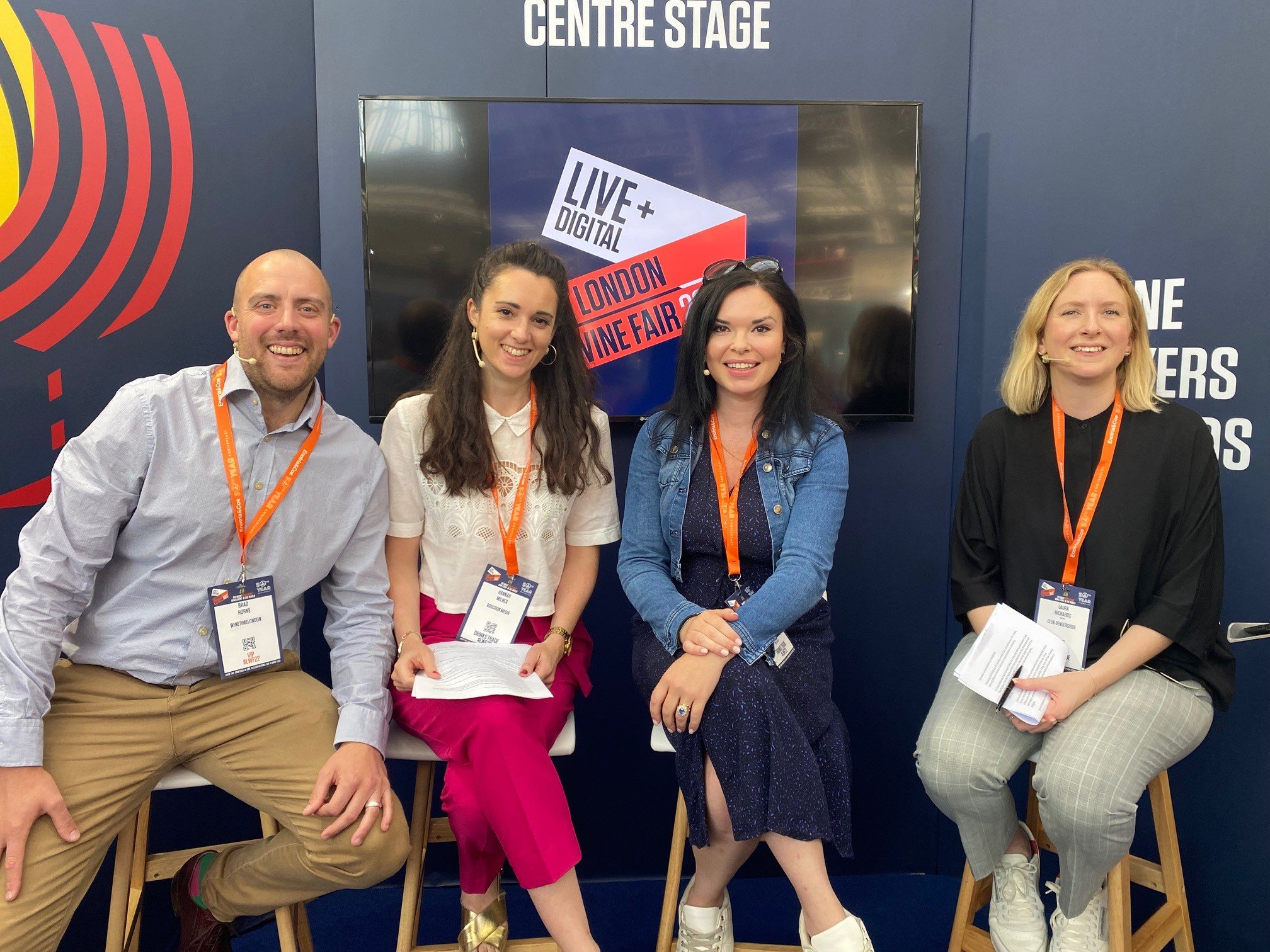
LR: So do you think the wine world is ready for the metaverse?
HM: No!
BH: Instagram and Twitter will still be there, print journalism, everything will still be there. But it's ever evolving like the wine world, like digital and social media. It's all evolving every day, every week to something new. So I don't think they're going to go anywhere, but there should be more and more content.
LZB: I’m hoping there'll be a lot more diversity in the industry. There's been such a rapid infusion of women and different ethnicities coming into wine, but I think in five years hopefully the speed of change will keep going and we’ll be seeing a lot more variety.
BH: Diversity in social backgrounds too – wine can be seen as quite elitist and as someone who grew up on a council estate with a single mum, it would be great to see more people from different walks of life.
LR: Do you think it's is any easier to become a wine communicator now? What are the current obstacles people face if they want to get into my communication?
HM: I think it is quite tough because I've done it myself. I came back from working vintages and I didn’t know anybody, even though I'd already been working in wine for two years, and I found it really difficult to start off with. And it was basically through Instagram, I started talking to different people on Instagram, and then started picking up bits and pieces of work and that's really how I grew my network. I think it can be done and best thing is to network, network, network.
LZB: and that’s why it's so important that those who are established and those who are our peers and have come before seek to welcome in this next generation of social communicators because this is the future for all of us. And it's going to be much nicer if we work all together.
LR: And so I guess that leads me on to my final question: is wine communication changing for the better?
HM: Yes, I think it's especially because social media has a low barrier for entry, so you're having all different people joining in the conversation, so the diversity is much bigger.
LZB: There is also more room for cloudiness, because if everyone can have a voice, which of course I’m a big fan of, things can be miscommunicated. So, I'm definitely not going to say that it's a perfect world. But I think that if there is more inclusivity and people are welcome in, they will educate themselves as it goes on. We will learn from each other and grow and that is a positive direction to take, if not a perfect one.
